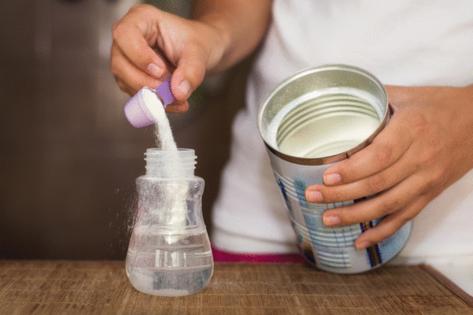Investigation into sickened babies continues after rare California program ID's botulism
Published in News & Features
Health officials are warning parents to avoid an infant formula linked to a nationwide botulism outbreak.
As of Nov. 10, 13 babies across 10 states — including one in Los Angeles County — have been sickened by the bacterial spore after consuming ByHeart Whole Nutrition Infant Formula.
The cases were first identified by the California Department of Public Health.
The state operates the Infant Botulism Treatment and Prevention Program, the only manufacturer and provider of an FDA-approved anti-toxin for infant botulism. Officials were tipped off to the outbreak when they noticed an increase in requests for BabyBIG, the anti-toxin, this August, according to Robert Barsanti, a health department spokesman.
The state alerted the U.S. Centers for Disease Control and Prevention and sparked a nationwide investigation, which is ongoing.
Health officials are asking major retail stores such as Amazon, Target, Walmart and Whole Foods to remove the product from their shelves. They are also asking parents and caregivers to check their infant formula and throw away any cans manufactured by ByHeart Inc.
If a parent or caregiver thinks they may have a child with botulism who has ingested baby formula, take photos of the can and lot number, said Jemma Alarcon, medical director of the Los Angeles County health department’s Food and Water Safety unit.
“We’re recommending they either return it to where they got it, so they can get a reimbursement, or they can just throw it away,” she said. “It is very important that if you do see symptoms, like sleepiness, lethargy, constipation, or the baby is not acting like itself, just go to the emergency room, go to your primary care doctor and let them know that the baby was consuming this formula.”
In a press release, county health officials also mentioned symptoms such as difficulty feeding, sucking or swallowing; weak cry or diminished facial expression; poor head control; and muscle weakness or trouble breathing.
On Saturday, ByHeart voluntarily recalled two lots of the contaminated infant formula: Lot 206VABP/251261P2 (Use by 01 Dec 2026) and Lot 206VABP/251131P2 (Use by 01 Dec 2026).
There have been no deaths associated with the outbreak.
According to the FDA, the product accounts for less than 1% of all U.S. infant formula sales.
Nine of the 13 cases in the outbreak so far have been confirmed; four are pending. All are associated with the same formula and the same strain of bacteria.
The company said in a statement on its website that it has voluntarily recalled the lots, but noted that the powdered formula tested by the California Department of Public Health came from a can that had previously been opened.
“We know that Clostridium botulinum is a bacteria that exists naturally in the environment — in places like soil, dust, and even vegetables — meaning that an opened can can be contaminated in multiple ways,” the company said on its website.
It also noted that “global regulatory and scientific authorities do not recommend testing powder infant formula for Clostridium botulinum, and no U.S. or global infant formula company tests for Clostridium botulinum.”
Spores produced by the botulism bacteria are heat-resistant and exist widely in the environment. In the absence of oxygen they germinate, grow and then excrete toxins.
Although the disease is rare, it is associated with improperly processed food that allows the bacteria spores to survive and grow. If left untreated, the toxin can lead to respiratory failure and death..
The disease is acquired differently in infants than in adults. For an adult to get the disease, they must ingest the toxin. Infants, on the other hand, can get sick just from ingesting the bacterium because it will develop into the toxin in their gut, due to their immature immune systems.
Bill Marler, an attorney with Marler Clark, a food safety law firm, said infant botulism cases are exceedingly rare. He said he has a client in Arizona whose infant was hospitalized for two weeks and placed on a feeding tube for four weeks after ingesting allegedly contaminated ByHeart formula.
He said botulism spores are associated with deficiencies in cleanliness on food manufacturing lines. Once they are established in a food source, however, they are hard to get rid of.
“Botulism spores are pretty tough to kill, even with the hot water that you would add to infant formula,” he said. “Those spores are hardy little guys. It could have come in on, you know, somebody shoes or palette, or, you know, anything like that.”
_____
©2025 Los Angeles Times. Visit at latimes.com. Distributed by Tribune Content Agency, LLC.







Comments